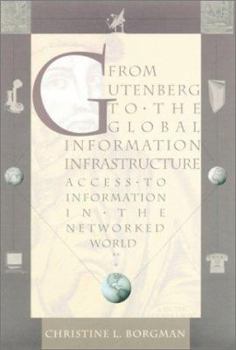From Gutenberg to the Global Information Infrastructure: Access to Information in the Networked World (Digital Libraries and Electronic Publishing)
Select Format
Select Condition 
Book Overview
Will the emerging global information infrastructure (GII) create a revolution in communication equivalent to that wrought by Gutenberg, or will the result be simply the evolutionary adaptation of existing behaviour and institutions to new media? Will the GII improve access to information for all? Will it replace libraries and publishers? How can computers and information systems be made easier to use? What are the trade-offs between tailoring information systems to user communities and standardizing them to interconnect with systems designed for other communities, cultures and languages?
Format:Hardcover
Language:English
ISBN:026202473X
ISBN13:9780262024730
Release Date:January 2000
Publisher:Mit Pr
Length:324 Pages
Weight:0.20 lbs.
Dimensions:9.5" x 1.3" x 6.3"
Customer Reviews
2 ratings
One of the most important books on information science
Published by Thriftbooks.com User , 23 years ago
The global information infrastructure may be serve as the cornerstone in the development of the world over the next decades and beyond. An understanding, or at the very least an appreciation, of the potential benefits and risks that can result from the still emerging technology is critical to ensure that the potential benefits of the technology, as actually implemented, will justify the concomitant hazards. Questions abound: In what context and by what methods will digital libraries be implemented and made available? Will the need for intellectual access be accounted for? Who will design the infrastructure? Who will manage the metadata on which the system is dependent? Who control our sources of information? How is that control to be monitored? And who do we want controlling information about us? In what I believe to be one of the most important books to be published in the field of information science, Dr. Borgman astutely addresses many of the critical issues facing the emerging global information infrastructure and notes that there are more questions than answers. The author, a preeminent scholar in this field, has provided a framework from which a user of the Internet, or, indeed, anyone interested in what is one of the most powerful systems to be created by man, can begin to appreciate the implications of this system. Ignorance is only bliss in the short run.Published in 2000 and winner of the American Society for Information Science and Technology's 2001 Best Book Award, this book is current, timely and uniquely relevant. As an attorney involved with intellectual property rights and as an engineer who began working with computers in 1962, I wholeheartedly recommend this book.
Startlingly wide-ranging look at information access
Published by Thriftbooks.com User , 23 years ago
Borgman creates a compelling discussion about the GII (Global Information Infrastructure) and its actual impact on the current and near-future world. She looks at it from the point of view of access to information, scholarly publishers, digital libraries and the future of the library itself. While wide-ranging, it never loses the plot or becomes difficult to read. Worth the price of the book just to have her reference list.





